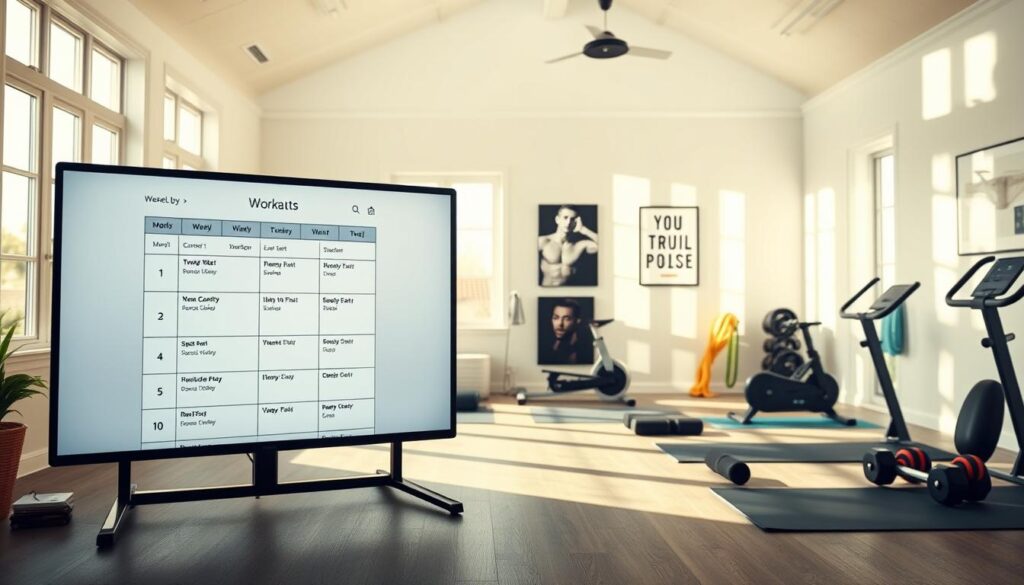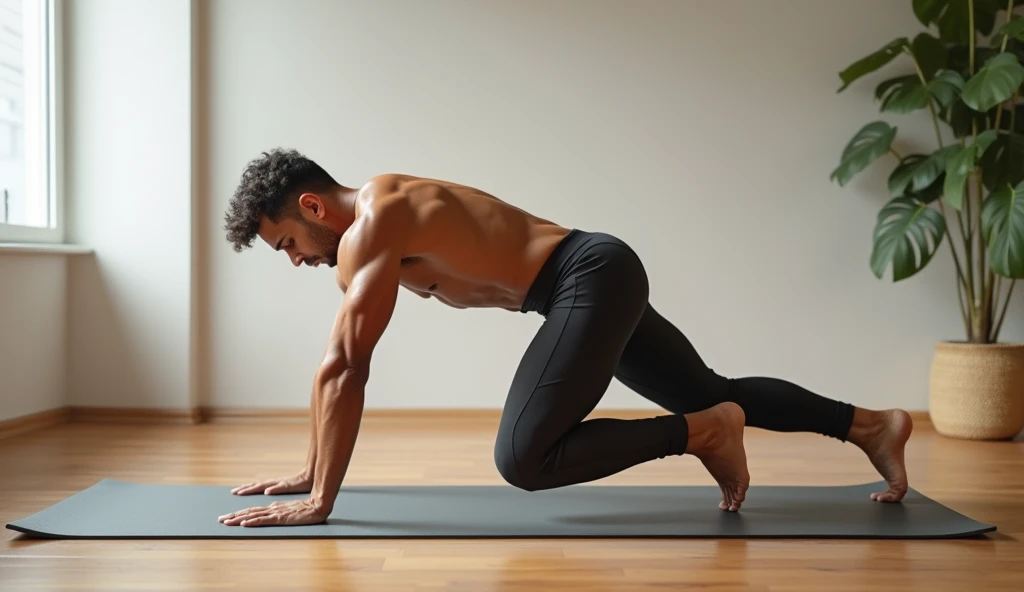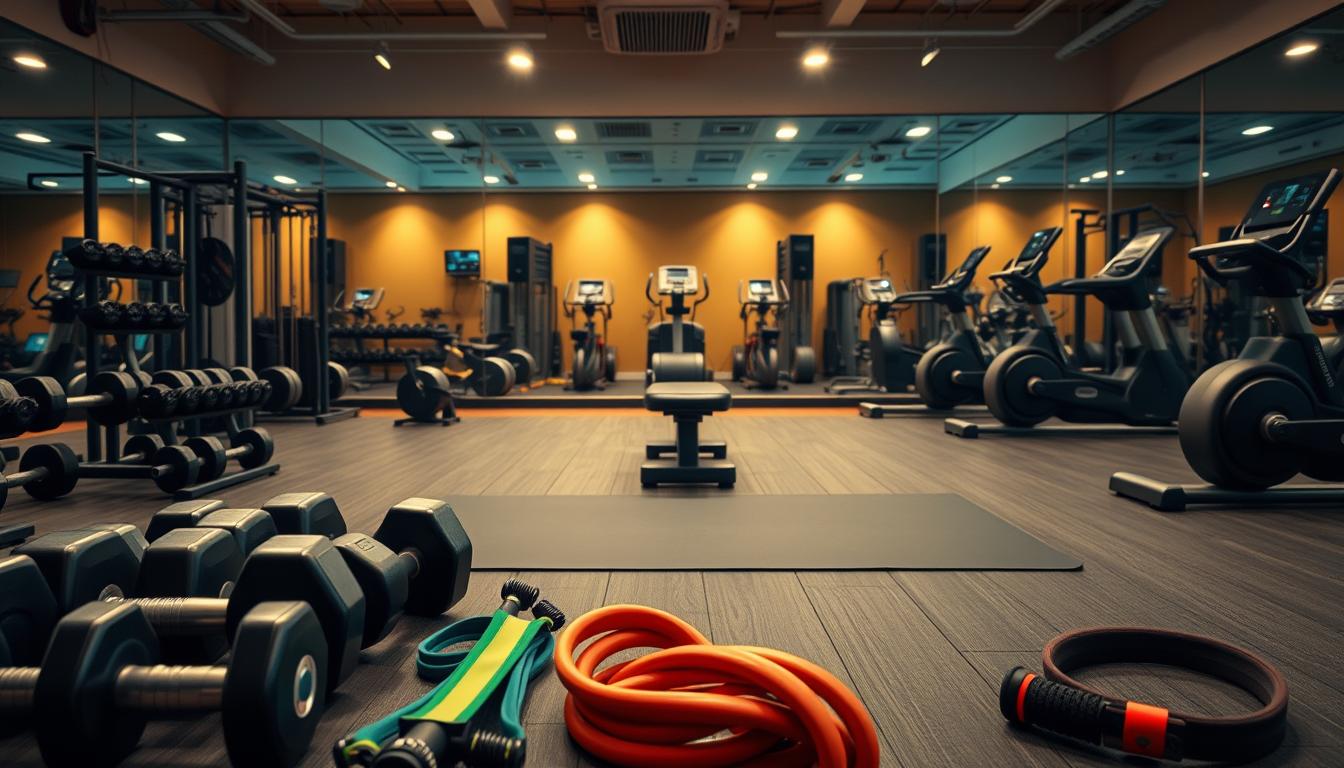There were mornings I’d hit snooze three times, dreading the rush to the gym before work. Evenings felt impossible with errands piling up. I wanted to lose weight but kept hitting walls—cost, time, crowded gyms.
What if I told you the solution has always been right under your nose? This home workout plan for weight loss is your answer. No more excuses. You can lose weight at home with just 30 minutes a day, using space as small as a living room.
Imagine progress without pricey memberships or rigid schedules. This plan adapts to you, not the other way around.
Key Takeaways
- Effective weight loss workouts can be done entirely at home.
- No need for expensive equipment or gym memberships.
- 30-minute daily sessions fit into even the busiest schedules.
- Personalized routines adjust to your fitness level and goals.
- Combines exercise and nutrition tips for sustainable results.
Why a Home Workout Plan Works for Weight Loss
Creating a home exercise plan can change how you lose weight. Studies show at-home workouts help you stick to it. Let’s see why this method works.
Benefits of Working Out at Home
- Privacy: Try new moves without worrying about what others think.
- Convenience: Save time by not having to travel to the gym.
- Consistency: Working out at home can make you stick to it 40% more than gym workouts, research finds.
Cost-Effectiveness of Home Workouts
A home exercise plan saves a lot of money. Here’s a comparison:
| Category | Gym Membership | Home Setup |
|---|---|---|
| Yearly Cost | $600–$1,200 | $100–$200 (basic gear) |
| Time Saved | 1–2 hours/week commute | 0 travel time |
| Flexibility | Limited hours | 24/7 access |
Most people save $500+ a year by working out at home.
Flexibility in Scheduling Workouts
With at-home workouts, you decide when to exercise. You can:
- Do 15-minute AM sessions
- Break 30-minute routines into 10-minute parts
- Do yoga at night after work
“Flexibility increases adherence by 27%,” says the American Council on Exercise.
Setting Realistic Weight Loss Goals
I suggest starting with clear goals to keep your health journey on track. It’s not just about the number on the scale. Focus on body composition instead. Don’t chase quick fixes like “get in shape fast.” Build a lasting fitness routine instead.
⏳ Get Your Energy Back with Discount!
How to Measure Body Composition
Here are ways to track your progress:
| Method | Description | Tools |
|---|---|---|
| Body Fat Percentage | Estimates fat vs. lean mass | Calipers, smart scales |
| Body Measurements | Waist, hips, and thigh measurements | Tape measure |
| Progress Photos | Visual changes over time | Camera or smartphone |
Choosing a Weight Loss Timeline
Target 1–2 pounds lost each week. Fast weight loss can hit a plateau. Aim to lose 20 pounds in 4 months. Stay away from fad diets that promise quick results without lasting benefits.
Setting Short-Term and Long-Term Goals
- Short-Term (1–2 months): Walk 30 minutes daily or add 2 strength sessions weekly.
- Long-Term (4–6 months): Lose 15–20 pounds while keeping up a consistent fitness routine.
“SMART goals keep you grounded.” – Fitness experts say goals should be specific and flexible.
SMART goals are Specific, Measurable, Achievable, Relevant, and Time-bound. For example, “I’ll reduce body fat by 5% in 8 weeks.”
Designing Your Home Workout Plan
Creating a good home workout plan begins with understanding your starting point. Follow these steps to make a routine that fits your abilities and challenges.
Assessing Your Current Fitness Level
Begin by testing your baseline with these simple checks:
- Push-up endurance: Count reps in 30 seconds.
- Wall sit stamina: Time how long you can hold a seated position against a wall.
- Cardio fitness: Track your time for a 1-mile walk or jog.
Selecting the Right Exercises
Bodyweight exercises like squats, lunges, and tricep dips are key. They work big muscles to burn calories. For example:
- Push-ups: Modify on knees if needed.
- Plank rotations: Add core engagement.
- Jumping jacks: Elevate heart rate during cardio bursts.
Incorporating Different Workout Types
Mix these formats weekly to avoid plateaus:
- HIIT sessions: 20-minute intervals for quick calorie burns.
- Circuit training: Rotate 3-5 exercises with minimal rest.
- Steady-state cardio: 30-minute walks or cycling for endurance.
Balance intensity and recovery to keep progress steady.
Essential Equipment for Home Workouts
You don’t need a lot of money to start working out at home. Choose gear that fits your budget and supports your fitness goals.
Must-Have Gear for Beginners
- Exercise mat: Protect joints during floor exercises.
- Resistance bands: Offer adjustable tension for strength moves.
- Comfortable athletic shoes: Prioritize stability for cardio and balance work.
Budget-Friendly Options
Think outside the box with what you already have:
- Water bottles as dumbbells for arm curls.
- Towels for sliding moves on hardwood floors.
- A sturdy chair for step-ups or tricep dips.
Optional Equipment for Enhanced Workouts
When you get stronger, you might want to add more:
- Adjustable dumbbells (e.g., Bowflex SelectTech) for varied weight training.
- Kettlebells for dynamic movements.
- Stability balls to engage core muscles.
The key to losing weight at home is to keep going. The right gear can help, but even simple tools can make a difference. Mix and match to fit your budget and goals.
Creating a Balanced Routine
A balanced workout routine fuels weight loss by blending exercise types. Here’s how to structure your at-home workouts for maximum results.
Combine Cardio and Strength Training
Pair calorie-burning workouts like running or cycling with strength moves such as squats or push-ups. Aim for 3-4 strength sessions weekly to build muscle, which boosts metabolism. Add 2-3 cardio days to burn fat. Tip: Alternate days or split workouts into 20-minute blocks if time is tight.
- Strength days: Focus on full-body circuits
- Cardio days: Opt for high-intensity intervals
- Mix both in one session? Keep durations shorter
Flexibility and Mobility Matter
“Stiff muscles hinder progress,” says fitness experts. “Injuries slow goals.”
Include 10-15 minutes of stretching or yoga daily. Dynamic stretches before workouts improve performance. Post-workout static stretches increase range of motion. Try foam rolling to ease muscle tension from at-home workouts.
Schedule Rest Days Wisely
Rest isn’t laziness—it’s recovery. Muscle grows during downtime. Aim for 1-2 rest days weekly. Active recovery options like walking or gentle Pilates keep you moving without strain. Listen to your body: soreness? Add an extra rest day. Track progress to adjust as needed.
Sample Weekly Home Workout Plan
Starting your fitness journey needs a solid plan. Here’s a home exercise plan to help you lose weight at home effectively. Make it your own to fit your goals.

| Day | Workout Type | Time | Focus |
|---|---|---|---|
| Monday | HIIT Cardio | 30 mins | Calorie burn, cardio endurance |
| Tuesday | Full-Body Strength | 45 mins | Muscle engagement |
| Wednesday | Restorative Yoga | 20 mins | Flexibility, recovery |
| Thursday | Circuit Training | 40 mins | Strength & cardio combo |
| Friday | Core Focus | 25 mins | Abdominal and stability work |
| Saturday | Active Recovery | 30 mins | Light walking/stretching |
| Sunday | Full Rest | N/A | Body recovery day |
Overview of a One-Week Routine
Stick to this weekly plan to balance hard workouts and rest. Adjust it if needed, but keep it regular.
Daily Workout Descriptions
- Monday (HIIT): Start with a 10-minute warm-up. Then, do 20 minutes of interval sprints or jump squats. Finish with a 10-minute cool-down.
- Tuesday (Strength: Do squats (3×12), push-ups (3x failure), planks (3×60 sec), and lunges (3×10/side).
- Friday (Core): Try Russian twists, leg raises, and bicycle crunches (3 sets each).
Adjusting for Your Fitness Level
Beginners: Start with half the sets and focus on proper form. Intermediates: Stick to the plan. Advanced: Add weights or do more reps. Remember, consistency is key—progress takes time.
Nutrition’s Role in Weight Loss
Getting in shape fast is not just about working out. What you eat plays a big role too. It fuels your workouts and helps you lose weight for good. Here’s how to make your diet work for you.
Understanding Macronutrients
Proteins, carbs, and fats are key to your body’s power. Aim for a mix: 30% protein to keep muscles strong, 40% complex carbs for energy, and 30% healthy fats for your metabolism. Use apps like MyFitnessPal to track what you eat and match it to your workout level and goals.
- Protein: Chicken, tofu, or Greek yogurt help muscles recover after working out.
- Carbs: Oats, quinoa, or sweet potatoes give you lasting energy.
- Fats: Avocados, nuts, and olive oil help balance hormones.
Meal Planning for Weight Loss
Meal prep makes healthy eating easier. Cook grains and proteins in bulk on Sundays. Replace high-calorie snacks like chips with veggies and hummus. For example, a grilled chicken salad with spinach and almonds is great for effective home workouts. It keeps you full without too many calories.
Staying Hydrated
Drinking water boosts your metabolism and cuts down on cravings. Aim for 8–10 cups a day, adding electrolytes when you’re really active. Feeling tired? It might be a sign you’re dehydrated. Keep a water bottle with you always. Drinking water before and after workouts helps you perform better and recover faster.
“Hydration is the body’s secret weapon for optimal energy and fat burning.”
Tracking Progress Over Time
Watching your progress with a home workout plan for weight loss
![]()
| Category | Details | Example |
|---|---|---|
| Workout Log | Record sets, reps, and duration | Push-ups: 3 sets of 10 reps |
| Body Metrics | Weekly measurements and photos | Waist measurement: 34 inches |
| Mood Notes | Energy levels post-workout | “Felt energized after 30-minute routine” |
Keeping a Fitness Journal
Write down bodyweight exercises done each day. Note how you feel afterward. Seeing changes over time helps spot trends. For instance, if you can do more push-ups, that’s progress.
Utilizing Apps and Tools
- MyFitnessPal: Tracks workouts and nutrition
- 7 Minute Workout: Logs bodyweight exercises progress
- Google Sheets: Create custom tables for body measurements
Celebrating Small Wins
Did you complete a full week of workouts? Treat yourself to a massage or new gear. Celebrate big milestones like:
- Completing 21 days straight
- Increasing plank time by 30 seconds
- Reducing resting heart rate
Every achievement boosts your dedication to your home workout plan for weight loss. Progress isn’t always steady—value every effort, not just results.
Staying Motivated During My Journey
Staying motivated is key to sticking with yourfitness routine. Here’s how to power through challenges:
Finding a Workout Buddy
Partnering with someone boosts accountability. Join online communities like Nike Training Club or local groups on Meetup. Schedule virtual check-ins or meetups to share progress and stay engaged.
Setting Up a Reward System
Reward milestones with non-food prizes:
- A new workout playlist for weekly goals
- Outdoor adventures for monthly achievements
- Premium app subscriptions after 3 months
Rewards reinforce habits by linking effort to tangible joy.
Overcoming Common Barriers
Face setbacks head-on:
- Time crunches: Break workouts into 10-minute sessions.
- Boredom: Mix calorie-burning workouts like dancing or HIIT for variety.
- Plateaus: Track progress with apps like MyFitnessPal and adjust routines.
Remember: Consistency matters more than perfection. Every small step keeps goals in sight.
Stay flexible—adjust plans when life gets busy. Celebrate each win, big or small, to keep momentum going.
Modifications for Different Fitness Levels
Adjusting workouts to your fitness level is key for safety and progress. Here’s how to make effective home workouts fit any level:
Follow these tips to create a routine that meets your goals:
Adjusting Workouts for Beginners
Beginners can start with these foundational moves:
- Wall push-ups instead of floor push-ups
- 10–15 minute sessions, 3x/week
- Focus on form over speed or reps
Intermediate Modifications
Intermediate levels can increase strength with these upgrades:
- 15–20 minute sessions with compound moves (squats, lunges)
- Reduced rest periods between sets
- High-intensity intervals (e.g., 30 seconds of burpees followed by 30 seconds rest)
Advanced Techniques for Experienced Lifters
Challenge yourself with these options:
- Plyometric moves like jump squats or box jumps
- Unilateral exercises (single-leg deadlifts, one-arm rows)
- Slowed tempo on lifts (e.g., 4-second lowering phase in push-ups)
| Level | Exercise Adjustments | Intensity/Duration | Progression Tips |
|---|---|---|---|
| Beginner | Wall push-ups, knee planks | 10-15 min sessions | Increase reps or time weekly |
| Intermediate | Squats, lunges, burpees | 15-20 min sessions | Shorten rest periods by 10% weekly |
| Advanced | Plyometrics, unilateral lifts | 20-30 min sessions | Increase speed/weight every 2 weeks |

Always focus on form before intensity. Progress slowly to avoid injury while keeping at-home workouts challenging yet achievable.
Common Mistakes to Avoid
Even the best home exercise plan can fail if common mistakes are ignored. Here are three pitfalls to avoid:
Skipping Warm-Up and Cool Down
Starting workouts without warming up increases injury risk. Begin with 5 minutes of dynamic stretches like leg swings and arm circles. Then, do light cardio, such as jogging in place.
After your workout, cool down with static stretches like hamstring holds. This prepares your muscles and improves blood flow, reducing soreness.
Ignoring Proper Form
- Squatting with arched backs
- Push-ups with sagging hips
- Lunges with uneven knees
Record your exercises on your phone to catch form mistakes. Use a wall mirror to check your alignment during workouts. Always choose quality over quantity—stop if your form is off.
Setting Unrealistic Expectations
“Progress isn’t linear. Focus on habits, not overnight results.” – NASM Certified Trainer
Many expect big changes in a short time, but losing weight at home takes patience. Track non-scale victories like better sleep or mood. Update your goals monthly, not daily.
Celebrate small wins, like doing 3 workouts a week, to stay motivated. Staying disciplined helps keep your home exercise plan on track. Small changes today prevent burnout and injuries, leading to steady progress.
Resources for Ongoing Support
Keeping up with a home workout plan for weight loss is not just about willpower. You need ongoing support. This support comes from people and tools that help you stay on track and get in shape fast.
Online Communities and Forums
Join groups like Reddit’s r/Fitness or MyFitnessPal’s forums to share tips and stay accountable. Look for communities that focus on gradual progress, not quick fixes. FitnessRX for Women offers expert-led discussions to steer clear of fad diets.
Fitness Apps and Streaming Services
Peloton Digital and Nike Training Club offer guided workouts tailored to your goals. Free options like YouTube channels from Yoga With Adriene or POPSUGAR Fitness add variety. Apps like MyFitnessPal help track your progress while staying within your budget.
Local Virtual Fitness Classes
Check local gyms like Orangetheory or 24 Hour Fitness for virtual classes. These classes combine live instruction with home workouts. ClassPass lists nearby studios offering online sessions, blending community support with personalized guidance.
FAQ
What are the best bodyweight exercises for weight loss at home?
How can I create a home workout plan for weight loss?
Are at-home workouts as effective as gym workouts?
How do I stay motivated to lose weight at home?
What equipment do I need for effective home workouts?
Can I do workouts at home to lose weight fast?
How important is nutrition when following a home workout plan?
How often should I schedule rest days in my home workout plan?
How can I adjust my home workout for different fitness levels?
What are some common mistakes to avoid when working out at home?
Did you like this article? See also: https://powerfitguide.com/top-exercises-for-slimming-your-waist/







